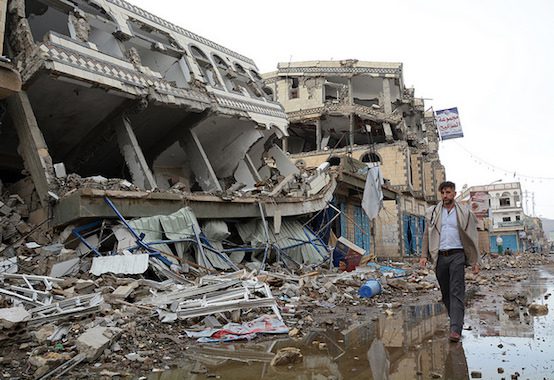The U.S. Remains Deeply Complicit in the War on Yemen

The atrocious U.S.-backed war on Yemen hasn’t ended. The New York Times reports on the use of U.S. weapons sold to the Saudi-led coalition to attack critical infrastructure and purely civilian targets:
But instead of defeating the rebels, the campaign has sunk into a grinding stalemate, systematically obliterating Yemen’s already bare-bones economy. The coalition has destroyed a wide variety of civilian targets that critics say have no clear link to the rebels.
It has hit hospitals and schools. It has destroyed bridges, power stations, poultry farms, a key seaport and factories that produce yogurt, tea, tissues, ceramics, Coca-Cola and potato chips. It has bombed weddings and a funeral.
The bombing campaign has exacerbated a humanitarian crisis in the Arab world’s poorest country, where cholera is spreading, millions of people are struggling to get enough food, and malnourished babies are overwhelming hospitals, according to the United Nations.
The damage to Yemen’s economy and infrastructure from the bombing campaign has been severe, and the strikes on bridges and ports in particular have exacerbated the humanitarian crisis by making it even more difficult to offload and deliver what little food and medicine still make it to the country. The attacks on these targets are not accidental. Even if they were, they would still be violations of international law, but they are even worse. The bombings of bridges and ports were done on purpose as part of the coalition’s effort to starve the population, and the attack on the funeral hall earlier this autumn was obviously a deliberate strike carried out without regard for the civilians that were sure to be present there.
The article is a fairly good report on the conditions in the country, but it still understates the importance of the U.S. role in the conflict. There are undoubtedly “U.S. fingerprints” on the bombing campaign, but there is more to it than that. If the coalition didn’t have U.S. refueling, weapons, and intelligence, and the contractors to service the coalition planes, the bombing campaign wouldn’t be practically impossible to continue. The point is that the administration could rein in the coalition’s war relatively eassily, but for over a year and a half has chosen to enable it despite extensive evidence of war crimes and the disastrous humanitarian situation in the country.